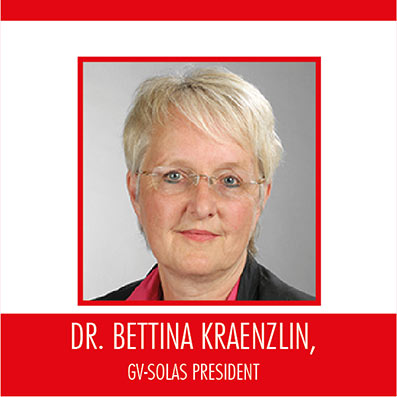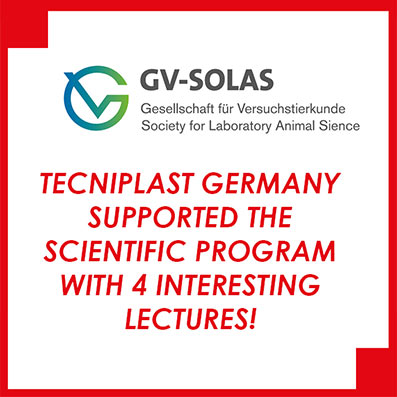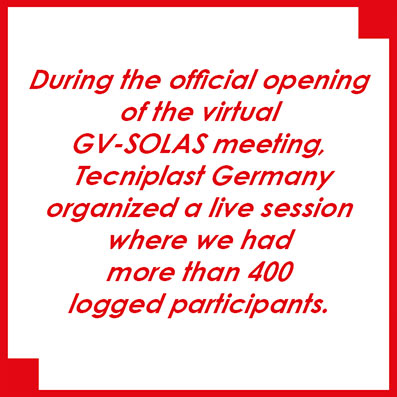
The current version of the Tecniplast website doesn't match your region. Please visit your local website to find information and offerings specific to your country.

The current version of the Tecniplast website doesn't match your region. Please visit your local website to find information and offerings specific to your country.


Tecniplast Germany, as well, organized a live session with more than 400 logged participants, that is a great success!
Dr. Bettina Kraenzlin, GV-SOLAS President organized as GV-SOLAS Conference President in 2021 the most important national event in the field of laboratory animal science in a virtual format.
Dear Dr. Kraenzlin, can you tell us a bit about expectations and results of this special GV-SOLAS meeting?
We at the GV-SOLAS 2021 board hesitated to turn the face-to-face meeting into a virtual one for a long time. However, due to the uncertain pandemic situation, we had to decide in favour of the virtual format and, to be honest, we did not regret it. One big advantage of virtual is that the participants can simultaneously attend presentations, since there was a total of 2.5 weeks to view the conference content. Thus the viewer can watch more presentations than at a 2.5-day face-to-face conference and can also scroll back and forth through recorded presentations to probably better understand the content.
 We provided 5 parallel sessions over 2 days with a very broad range of topics. We organized a total of 105 presentations in the GV-SOLAS and IGTP sessions as well as 9 workshops and roundtables. One third of the presentations and also of the workshops were in English. Especially for the English-speaking participants it was an advantage to pick out the appropriate lectures in English at their leisure. Many participants told us that to them all that was very effective and also relaxing.
We provided 5 parallel sessions over 2 days with a very broad range of topics. We organized a total of 105 presentations in the GV-SOLAS and IGTP sessions as well as 9 workshops and roundtables. One third of the presentations and also of the workshops were in English. Especially for the English-speaking participants it was an advantage to pick out the appropriate lectures in English at their leisure. Many participants told us that to them all that was very effective and also relaxing.
During the virtual sessions you and your team presented a very nice movie, giving a unique insight into your vivarium at the University Hospital of Mannheim. Can you please tell us a bit about your vivarium size, your organization and the equipment you are using for animal housing, logistics and cage cleaning?
Our institute is a Core Facility of the Mannheim Medical Faculty and offers all researchers the opportunity of carrying out experimental animal science projects. We can keep rodents, rabbits and fish in three separate animal houses. 2/3 of the mice and rats are kept in IVC cages and 1/3 in open cages in the Experimental Unit. DoubleDecker IVC cages are used for rat breeding. Both the rats and their caretakers like that cage type because of its many advantages. Rabbits are kept in groups on the floor and only in special cases in cages. We also provide laboratory space and a broad range of equipment. Training in various laboratory animal science techniques can be offered. We also have an embryo transfer lab, a histology and a clinical chemistry laboratory for the determination of plasma and urine samples from small rodents. Each of our three animal facilities has its own cage cleaning area, which are equipped with bedding stations, rack washers, semi-automatic bottle washing lines and autoclaves. This separation is necessary for logistical reasons, but also has hygienic advantages!
 During the official opening of the virtual GV-SOLAS meeting, Tecniplast Germany organized a live session where we had more than 400 logged participants. Do you see benefits in virtual meetings also in future or can ‘t you wait - as many people - to meet again live at the conference or something in between?
During the official opening of the virtual GV-SOLAS meeting, Tecniplast Germany organized a live session where we had more than 400 logged participants. Do you see benefits in virtual meetings also in future or can ‘t you wait - as many people - to meet again live at the conference or something in between?
I mentioned earlier that there are certainly advantages to virtual meetings. But of course, a virtual cannot create the atmosphere of a face-to-face conference and all its unique details, such as meeting friends and colleagues, the conversations “in the corridor”, the informal exchange of experiences while having a cup of coffee or a glass of wine, the "hands on products" at the industrial exhibition and, last but not least, the impressions of the venue, the flair of the city. We tried to make at least a little informal communication possible at the virtual get-together and in the "Meet & Talk" break discussions. Many participants took advantage of this and appeared there as "Avatars", but of course it is much nicer to meet live! I firmly expect that this will be possible again at the next GV-SOLAS meeting in 2023!
Tecniplast Germany supported the scientific program with 4 interesting lectures. Can you evaluate the quality of them in terms of contents and communication efficiency? Do you have suggestions for Tecniplast Germany for future similar initiatives?
Tecniplast Germany’s lectures about automatic data monitoring and the digital future in laboratory animal husbandry were forward-looking and are certainly currently discussed in many animal labs. Lab Animal Facility Managers must be kept up to date in order to make the right decisions when replacing large-scale equipment or equipping new buildings. One presentation explained how to make cage cleaning sustainable. Another one informed participants about news from the AK KAB working group.
It pays off that Tecniplast has been active in the AK KAB for many years, providing the chairman and passing on current information. For the first time at this conference, we dedicated a separate session to the topic “environmental protection and sustainability in laboratory animal facilities”. I think that in the future we will have to focus much more on this than we did in the past. Personally I also see a lot of catching up for our house and therefore consider this topic to be particularly necessary and valuable in the future!
The most successful Tecniplast virtual lecture was on DVC®, the automated data monitoring in vivariums. There was a high level of attention from both Lab Animal Facility managers and PIs. Can you tell us where you see the automated data monitoring in vivariums in 10 years from now and what benefits can be expected for LAF managers, animals and society?
I think that automated collection of activity data of laboratory animals in cages is of great value, because it provides us with reliable, statistically valid data on the well-being of the animals. It on one hand makes it in an ideal way possible for the lab animal facility management to control and standardise husbandry conditions and to improve these in the interest of the lab animals. On the other hand, these data can also support the experiments. Experimental conditions can be checked and standardized. Animal’s stress and pain can be recognised better than by selective observations and unusual experimental results might be explained. Unfortunately, I cannot predict to what extent the DVC® system will be established in 10 years, but the future of lab animal husbandry is certainly unthinkable without automated data collection.
FLORIAN KELLNER-FENDT - MANAGING DIRECTOR TECNIPLAST GERMANY